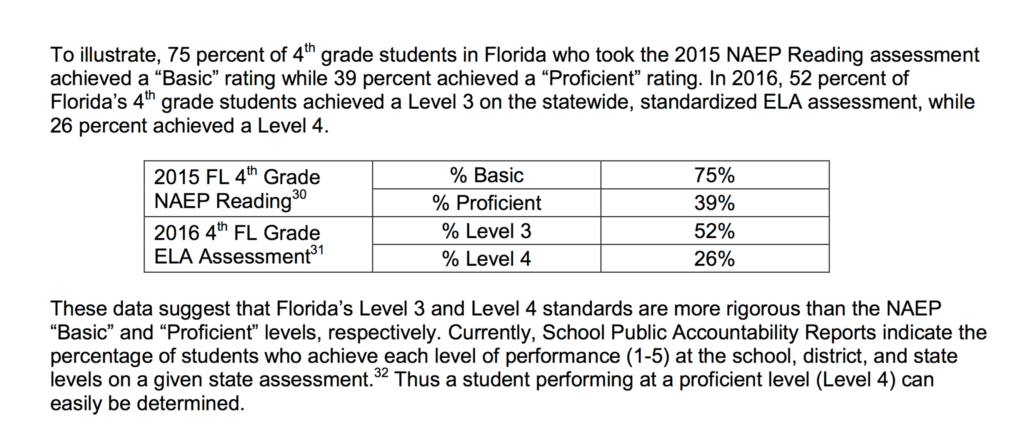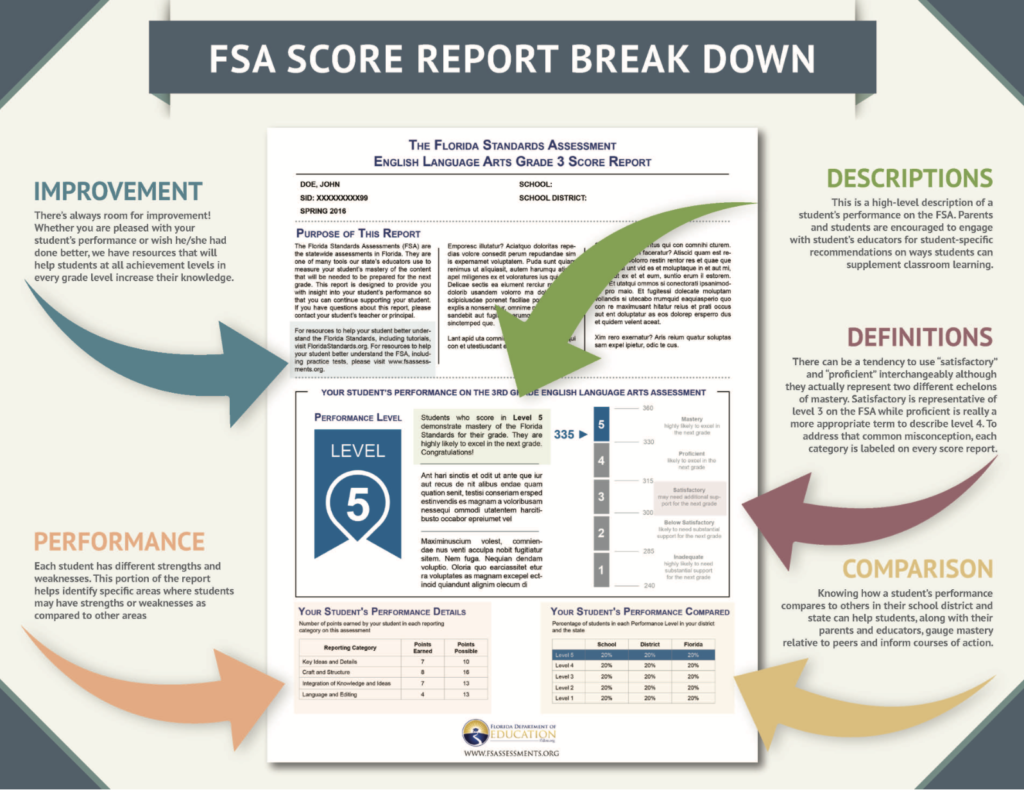SB926 Proficiency Language Compromise Gives the Foundation for Florida’s Future a Do-Over
Today the Senate Education Committee demonstrated their talents at speed talking as they raced through 21 bills and 3 Senate Confirmations in less then 115 minutes. From the opening statements, citizens were informed that public testimony would be limited to one minute per speaker. Racing through bills, restricting public testimony and limiting debate, does not describe a quality legislative process, but then again, this is Florida.
Senators presented their education bills at lightening speed. The discussed bills ranged from:
- the contentious Best and Brightest Teacher award SB1552
- concealed weapons on private school property SB1330
- expansion of virtual education SB868
- increased data collection and assessments in Voluntary Pre-K programs SB468 (because “if you don’t measure it means you don’t care)
- massive expansion of the current Tax Credit Scholarship Program SB1314
- State Testing and Accountability, Senator Flores’ SB926.
All bills were reported favorably by the Committee, most unanimously.
Senator Flores opened her bill (SB926) calling it a “very comprehensive education bill” that she felt would put Florida “on the path towards bringing back some sanity” to our accountability system. This was important phrasing because, over the weekend, Jeb Bush’s Foundation for Florida’s Future stopped referring to their bill as the “Fewer Better Tests” bills and renamed it “A Path to Fewer Better Tests”, declaring it would bring about “common sense changes to make testing more meaningful for all.” We suspect the name change might be due, in part, to how embarrassing it must be to present a “Fewer Better Tests” bill that doesn’t eliminate any tests or, frankly, make any improvements.
Nineteen amendments were filed to Flores’ original bill. She began by discussing the things that she knew would remain in the bill, suggesting that the committee meeting, and the public commentary was all for show and the voting outcomes were pre determined. After briefly discussing (and approving) an amendment by Senator Lee to allow successful performance on Advanced Placement, International Baccalaureate or other rigorous high school exams to satisfy the high school graduation requirements, further discussion was postponed until later in the meeting, allowing lightening fast favorable approval, with little time for discussion, of a litany of (mostly questionable) education bills which were summed up nicely by Senator Farmer who said “If we were adequately funding our public schools we wouldn’t need these programs at all…”
Committee discussion returned to SB926 at 3:13PM, with 18 amendments left to discuss before the meeting concluded at 3:30. Senator Galvano moved for a time-certain vote on the bill at 3:25, leaving 12 minutes to discuss 18 amendments and this bill. As far as I could tell, there were no objections to racing through this accountability bill. One amendment by Senator Stewart was withdrawn. and another was accepted, removing the requirement for 90 minutes uninterrupted reading instruction from students retained in 3rd grade (we would love to see the word uninterrupted removed from all state mandates for reading instruction because, as Sen. Stewart pointed out, this helps create some of the scheduling issues with recess in K-2).
All 5 amendments that Senator Simmons filed last week (on 3/20/17, when the bill was temporarily postponed), representing the content of Senator Montford’s widely popular, bipartisan SB964, had substitute amendments filed today. The new substitute amendments included slight modifications that, at one point, Senator Simmons admitted were the result of “compromise.”
From the beginning, our biggest concern with SB926 was its requirement that Level 3 FSA scores be labeled proficient (you can read about our original concerns here and here). Last week, Senator Simmons filed an amendment deleting that language from the bill. This morning a substitute amendment 351834 was filed that replaced the original. The substitute amendment still deleted SB926’s problematic proficiency language (lines 65-68), which would have been used to align Level 3 passing scores to proficiency (a term that mean above grade level achievement). This was good. The replacement amendment also added new language was to Senator Simmons’ original amendment:
The department shall study each of the achievement levels used for the statewide, standardized assessments and more specifically define the achievement levels in order to communicate the meaning of such levels to students, parents and teachers. As part of the study, the department shall review existing assessment reports and recommend changes that better communicate the meaning of the achievement levels and their relationship to student performance and success. The department shall submit the report with its recommendations to the Governor, the President of the Senate, the Speaker of the House of Representatives, and the state board by July 1, 2018.
This new language represents the “compromise” that Senator Simmons mentioned earlier.
For the record, in January 2016, Pam Stewart, Commissioner of Education, presented the results of the exact same type of study this amendment calls for, during the cut score process for the new FSA exams. The results of that study, which led to the Commissioner’s recommendations to align FSA Level 4 to “proficient” and Level 3 to “satisfactory”, are outlined in the report titled “Florida Department of Education, State Board Analysis on Other States’ Cut Points as Compared to NAEP Performance (2015).” Legislators can find this report clearly discussed in the Staff Analysis to SB926’s House companion, HB773.

The FLDOE, also presented a report comparing other states’ cut scores compared to NAEP performance and found little little correlation between NAEP performance and state cut scores. This report is also reviewed in the HB773 staff analysis.
Shortly after the approval of the alignment of Level 4 to NAEP proficiency by the State Board of Education (by a vote of 6-1), Commissioner Stewart, unveiled a revamped student score report for Florida State Assessment (FSA) results. It was meant to clearly explain what a Level 1 through Level 5 score represents, giving parents better, more actionable information regarding their child’s performance. The new score report was designed to make the FSA results more meaningful, exactly the goal of the “compromise” language in Senator Simmons’ substitute amendment.

If you have been paying attention to Florida education policy, you have seen this scenario before. This is clearly the work of the Foundation for Florida’s Future. In January 2016 and for months before, the Foundation argued, before the Board of Education, for alignment of Level 3 to NAEP proficiency. They created a website”whyproficiencymatters.com” and created the rhetoric to promote the so-called “honesty gap.” The Florida Board of Education, however, in a vote of 6-1, decided to support the recommendation of the Department of Education and not the Foundation’s. We suspect the “new and improved score report”, unveiled by the DOE in 2016, was part of a “compromise” with the Foundation back then. But rather than accept the FLBOE’s decision, the Foundation wrote the “Fewer Better Tests” bills with the intent of “sneaking” the proficiency language past legislators desperate to bring relief to our over tested public school children.
When legislators, like Senator Simmons, were alerted to the devastating effects the “hidden” proficiency language in SB926would have, raising FSA passing scores to above grade level performance, they worked to eliminate the language from the bill. The original amendment simply removed the proficiency language. Now, the Foundation appears to be asking for another “compromise” consisting of another study of achievement levels and a “more meaningful” score report.
It appears what the Foundation for Florida’s Future really wants is a do-over. They want another chance to influence the alignment of FSA scores inappropriately to NAEP. Repeating a study that was completed barely over a year ago is a complete waste of time and money. Recreating the newly designed score reports is, also, nonsense.
If the Senators had not been made aware of the existence of the recent alignment study and the new and improved score reports previously, they were certainly informed during the limited public comment on this amendment, when Tallahassee public school parent, Marie Claire Leman, pointed out the existence of the DOE study (watch at 1:40:30). Senator Mayfield asked “If we already had a study done then what do we expect this study to do?” Short on time, Senator Simmons was allowed to explain this in his brief close: “this is a compromise.”

We need to throw Jeb Bush’s Foundation out on its bum!
Great read.